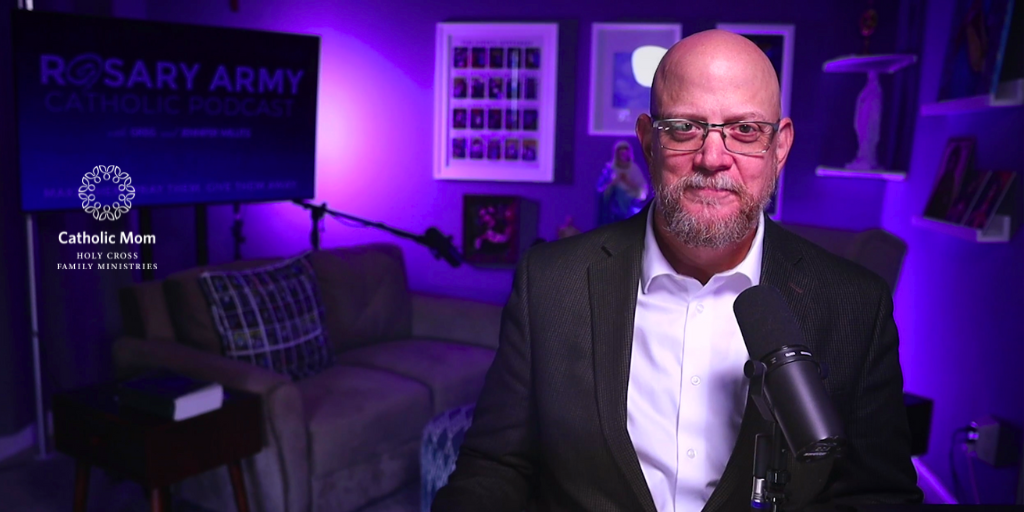
Lisa M. Hendey shares her conversation with Greg Willits, author of the new book God Doesn't Hate Me After All from Sophia Institute Press.
God Doesn’t Hate Me After All: Discovering Louis de Montfort’s Love of Eternal Wisdom
by Greg Willits
Published by Sophia Institute Press
In many ways, I feel that I owe much of my professional “success” over the years to my friend, fellow author, and Catholic media “pioneer” Greg Willits. Greg and his lovely wife, Jennifer, were at the forefront of the New Media initiatives being undertaken here in the Church in the US twenty years ago. Greg took a big chance on me, a groupie of his, back then, by inviting me to join a coalition of podcasters at SQPN. That little show of mine led directly to the publication of my very first book. All these years later, I’m humbled and honored to share my recent email conversation with Greg as he celebrates today’s launch of his new book, God Doesn’t Hate Me After All: Discovering Louis de Montfort’s Love of Eternal Wisdom.
For centuries, St. Louis de Montfort’s The Love of Eternal Wisdom has been treasured by the Church but left unread by lay Catholics, especially in modern times. Its mystical language is seen as daunting, its insights obscured by archaic eighteenth-century prose. Now Catholic author and Rosary Army founder Greg Willits breathes new life into this hidden gem by weaving his own moving life story into de Montfort’s inspired words.
To say Greg’s book is profoundly honest and spiritually impactful is an understatement. As Greg juxtaposes his own journey alongside St. Louis de Montfort’s lesser-known classic, we have the opportunity to learn from two spiritual giants who never shy away from our universal need to run with open arms into the embrace of the God who loves us so dearly, right where we are. I hope you enjoy this chat and that you’ll give yourself the gift of reading Greg’s book and connecting with him and Jennifer at Rosary Army.

Greg Willits is the founder and executive director of RosaryArmy.com, which since 2003 has inspired millions with its mission: Make Them. Pray Them. Give Them Away. He is an award-winning media producer, author, and the creator and co-host of the Rosary Army Catholic podcast with his wife, Jennifer. Together, they have reached global audiences through SiriusXM, EWTN, CatholicTV, Relevant Radio, and more. They also lead online formation through SchoolOfMary.com. Greg and Jennifer live in Georgia and are the proud parents of five children and one grandchild.
Q: Greg, it’s so wonderful to reconnect with you! Congratulations on the publication of God Doesn’t Hate Me After All: Discovering Louis de Montfort’s Love of Eternal Wisdom. Please briefly introduce yourself.
Thanks, Lisa — it’s great to reconnect after all these years! If I recall correctly, we’ve known each other for over EIGHTEEEN YEARS now. In fact, I went looking in my photos and found what might be the first picture of us together (along with my wife, Jennifer) from the 2007 Podcast and Portable Media Expo in Ontario, California. We were all a lot younger looking then!
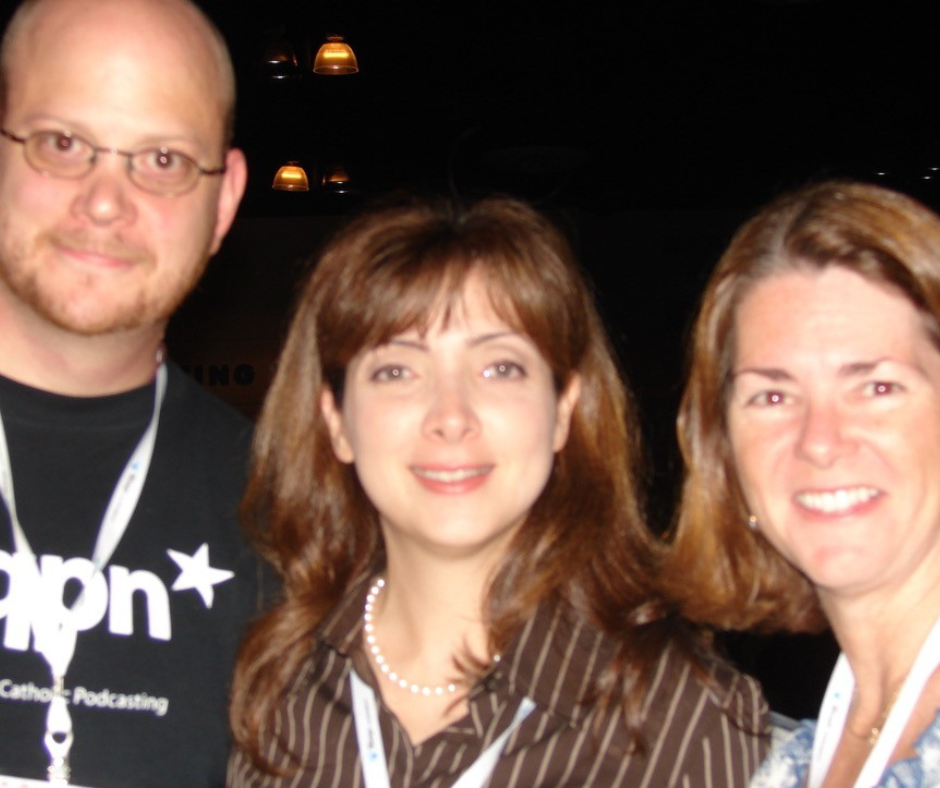
As a brief introduction, I’m Greg Willits, husband to Jennifer, father of five kids here on earth and five in heaven, newly a grandfather, and co-founder of Rosary Army, an apostolate we started in 2003 to promote the Rosary and encourage people to make, pray, and give away all-twine knotted Rosaries. If you’ve ever seen one of these Rosaries in the last twenty years, there’s a good chance someone learned how to make them from Rosary Army. Along the way, I’ve hosted several podcasts, a radio show, produced Catholic media, and recently published my fourth book, God Doesn’t Hate Me After All: Discovering Louis de Montfort’s Love of Eternal Wisdom from Sophia Institute Press. Through it all, my hope has stayed the same: to help people grow closer to Jesus through Mary, to pray their Rosary every day, and to do whatever it takes to be holy.
Q: You’re broadly published, but it’s been a while since your last book. I know why I personally take pauses in my writing and what coaxes me back into print. For you, what prompted this book at this time in your life?
For a long stretch, I wasn’t ready to write this kind of book, or anything for that matter. In fact, by 2021, mental health issues had all but stolen my ability to write (thus the long break between books). In all of our years of producing Catholic media, however, my wife and I had an unspoken rule that my lifelong depression and anxiety were not topics for public discussion. But it was undeniable that, in the past, whenever we shared our experiences of miscarriage, unemployment, or other life challenges, those topics resonated most deeply with audiences. So many people feel alone in their difficulties, and they told us that our candor gave them comfort in their suffering. So, after I was diagnosed with PTSD in 2018, we decided to finally start sharing the hidden battle that had been secretly going on in our lives. God Doesn’t Hate Me After All emerged from years of spiritual wrestling, therapy, prayer, healing, and rediscovery. During that time, I found St. Louis de Montfort’s The Love of Eternal Wisdom, which completely changed how I understood God’s love, and radically transformed how I’ve long told my own life story. I realized that the pain and confusion I’d experienced weren’t wasted; they were invitations from God to see Him more clearly. Writing the book is a response to what I felt God asking me to share now, in an age of so many people seeking peace and healing from their pasts, and hope for their futures.
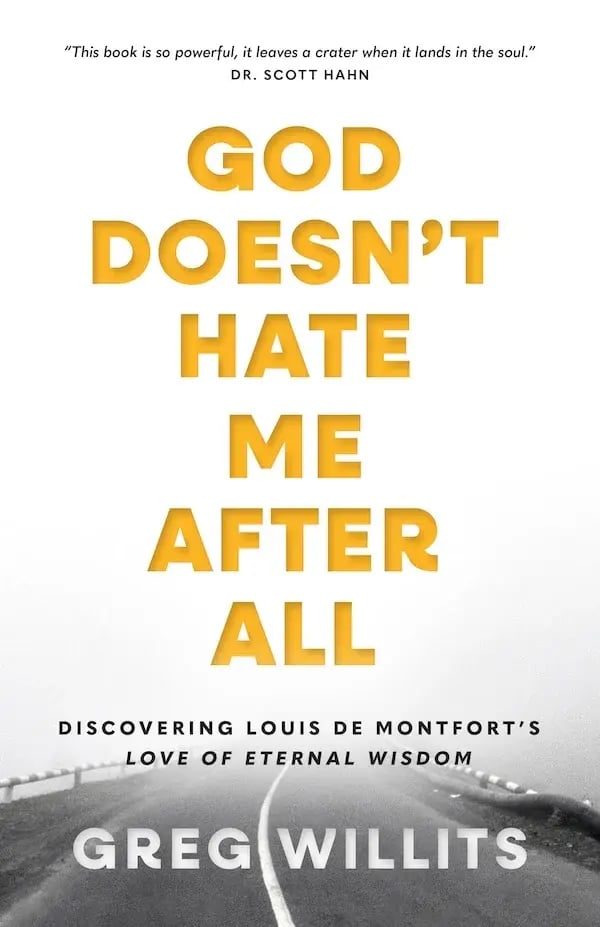
Q: In your Introduction, you write, “To have the heart of Jesus and to truly possess and understand His love, we need to have a mind focused on Jesus.” As someone active for decades not only in living but also in sharing your faith with others, how was this a fundamental shift for you?
That line came from recognizing how easy it is to do many Catholic things without truly knowing Jesus Christ on a personal level. For years, I was active in ministry, but my interior life struggled to absorb the love Jesus personally offered me. I saw His love more easily applied to the lives of those I was speaking to than to myself. Through St. Louis de Montfort, I began to see a different, clearer pathway to what he calls “possessing Jesus Christ.” This includes retrospectively looking at the most painful moments of my life when it first felt like Jesus was absent, and now seeing how He was there all along. This was radically transformative for me. That shift changed my faith from performance into relationship. It’s what moved me from “working for God” to actually walking with Him.
Q: This book invites readers to know and connect deeply with St. Louis de Montfort’s hidden masterpiece, The Love of Eternal Wisdom. By sharing your own spiritual memoir as you contemplate the text, you invite us to consider the places where our own lives intersect with his message. Why is this centuries-old book timely for this moment in our culture?
First off, I have to express my gratefulness to the Montfort Missionaries for allowing me to republish the entirety of de Montfort’s Love of Eternal Wisdom side-by-side with the chapters of my book. To have basically co-written a book with my favorite saint is nearly beyond my ability to comprehend. From the beginning of this project, my primary goal has been to introduce more people to this classic by St. Louis de Montfort. If baring my soul and my sinfulness, as I do in this book, helps make that happen, then my mission will be accomplished.
To more directly answer your question, The Love of Eternal Wisdom is so needed right now because it’s not about being a centuries-old book so much as an antidote to the pain of human hearts. That pain hasn’t changed much since de Montfort recommended the solution in the love of Eternal Wisdom, which is the love of Jesus Christ for each of us. We still chase success, approval, and distraction instead of the genuine peace of Christ. De Montfort’s The Love of Eternal Wisdom speaks directly to that ache we all have to be loved and to make sense of suffering. His writing shows that wisdom isn’t about intellect or achievement — it’s about surrender and love. In a noisy culture that constantly tells us we’re not enough, this book whispers the opposite: you are infinitely loved, and de Montfort shows us how to actually feel that love, despite all of the weakness, sins, and stumblings of our lives — past and present.
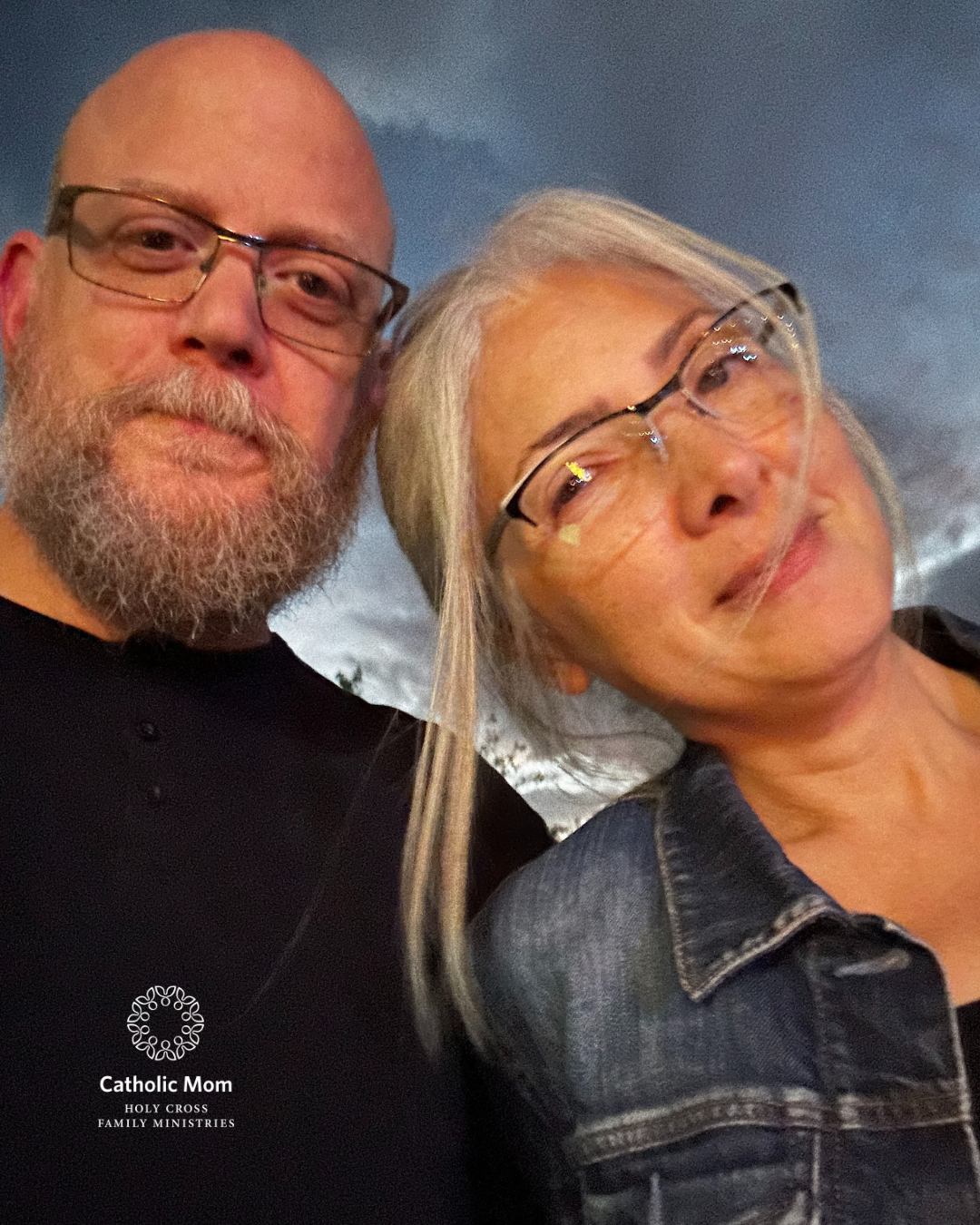
Q: I’d like to thank you for your honesty and transparency in sharing your own spiritual journey and your desire to know and love God. What helped you to overcome any hesitation you had in writing this memoir so openly and vulnerably?
I wouldn’t say I necessarily overcame it. I’m still quite nervous about the responses I may receive to the transparency. Even though I’m now in my mid-fifties, there’s a part of me who still worries about being scolded for some of the terrible things I’m now admitting to in this book as having done in my teens and twenties. I even had to warn my children (now all in their twenties, except for our youngest) that, should they ever read this, their perspective on their saintly ol’ dad will most likely change.
Having said all that, I regularly thought of St. Augustine’s Confessions while essentially writing out my own 21st-century version. Admission of his weaknesses and sinfulness has allowed the glory of God’s mercy to shine forth for centuries. Here we are, 1600 years later, looking to him as an example of how God’s grace and mercy transform lives. Putting both my own sinfulness and my wounds was sometimes terrifying, but it’s all true. It all happened. And shame is allowed to fester when woundedness remains covered. I don’t want to live the remainder of my years embroiled in the shame that controlled me for so much of my life. If my honesty can help someone realize that God hasn’t abandoned them, then it’s worth the risk of vulnerability.
Q: What are your hopes for those of us who will read God Doesn’t Hate Me After All?
As I previously stated, my first and greatest hope is that our modern world discovers what I’ve discovered: the timeless message of St. Louis de Montfort’s The Love of Eternal Wisdom. They’ll discover it both in the full reprinting of that treatise within my book, as well as in the spiritual essays I wrote that — I hope — bring to life God’s love and mercy. My hope is that readers will stop running from God and finally let Him love them. I want people to know that their brokenness doesn’t define or disqualify them — it’s the very place where Eternal Wisdom wants to meet them. My hope is that my book will be a starting place for many to find that love of Eternal Wisdom.
Find God Doesn’t Hate Me After All: Discovering Louis de Montfort’s Love of Eternal Wisdom at Sophia Institute Press, Amazon, or your favorite bookstore.
Connect with Greg and Jennifer Willits at RosaryArmy.com.
A question for you:
What spiritual classic has significantly impacted your faith journey? Why?
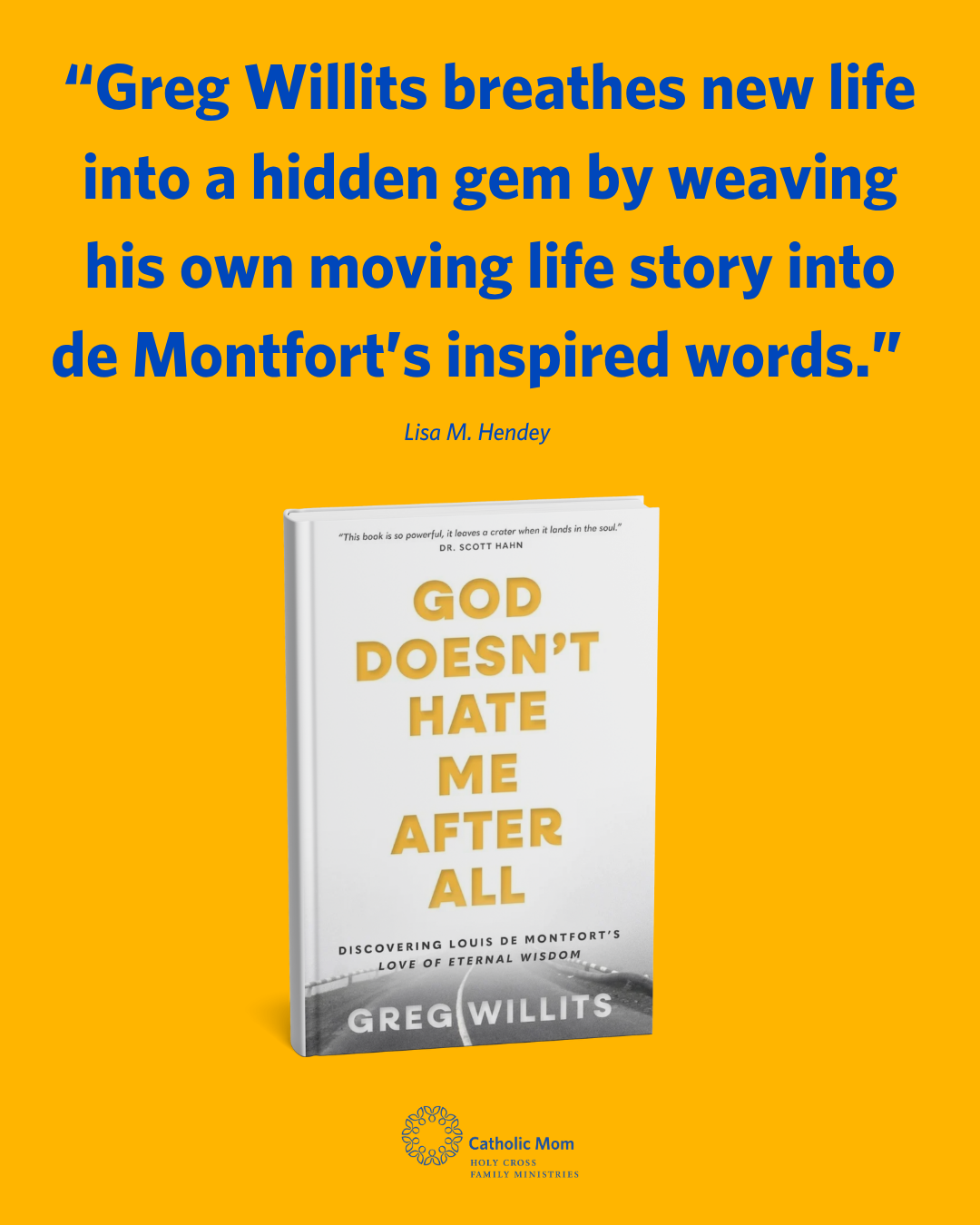
Share your thoughts with the Catholic Mom community! You'll find the comment box below the author's bio and list of recommended articles.
Copyright 2025 Lisa M. Hendey
Images: courtesy of Greg Willits, all rights reserved, used with permission
This article contains Amazon affiliate links, which provide a small compensation to the author of this piece when purchases are made through the links, at no cost to you. Thank you for supporting our Catholic Mom writers in this way.
About the Author

Lisa M. Hendey
Lisa M. Hendey is the founder of CatholicMom.com, a bestselling author and an international speaker. A frequent radio and television guest, Hendey travels internationally giving workshops on faith, family, and communications. Visit Lisa at LisaHendey.com, on her Substack at LisaHendey.Substack.com, or on social media @LisaHendey for information on her speaking schedule or to invite her to visit your group, parish, school or organization. Find Lisa’s books on her Amazon author page.


.png?width=1806&height=731&name=CatholicMom_hcfm_logo1_pos_871c_2728c%20(002).png)
Comments